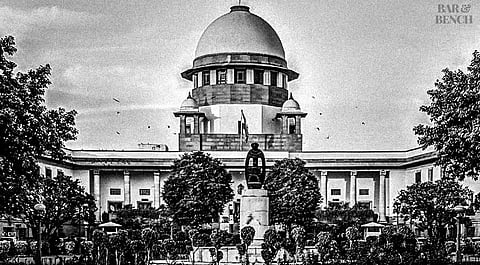
- News
- Columns
- Interviews
- Law Firms
- Apprentice Lawyer
- Legal Jobs
- हिंदी
- ಕನ್ನಡ

The Supreme Court has registered a suo motu writ in a matter concerning the assessment of the criminal justice system in response to sexual offences (In re: Assessment of the criminal justice System in response to sexual offences).
The Supreme Court Bench headed by Chief Justice of India SA Bobde, while registering the suo motu case, noted that after the Nirbhaya gang rape case of 2012, the conscience of the nation was shocked. However, despite the introduction of several amendments to the criminal justice system, the desired outcome of bringing down the instances of rape has not been achieved.
“As per the latest report of National Crime Records Bureau of Crime in India in the year 2017, total 32,559 cases of rape were registered in India. The delay in such matters has, in recent times, created agitation, anxiety and unrest in the minds of the people. The Nirbhaya case is not an isolated case where it has taken so long to reach finality In fact, it is said that it has been one of the cases where agencies have acted swiftly taking into account the public outrage.”
The Court has felt the need to step in at this stage, to take stock of the situation on ground and of the implementation of these amendments of ground. In this regard, the Court said,
“It is necessary to call for information with regard to status of affairs at ground level from various dutyholders like investigation agencies, prosecution, medico-forensic agencies, rehabilitation, legal aid agencies and also Courts to get a holistic view to make criminal justice system responsive in the cases of this nature.”
The Secretary General of the Supreme Court has also been directed by the Supreme Court to extend cooperation as regards calling for records from all the Chief Secretaries of all States, DG of Police of all States, and Registrar Generals of all High Courts.
The Court has called for records and status reports from all the States on various aspects of the criminal justice system in cases of sexual offences including the compliance of various guidelines issued on the same and amendments introduced, the manner in which cases of sexual offences are responded to and the procedure followed – at the investigative and trial stages. At the stage of trial, queries have also been posed regarding whether the courts have been ensuring the time-bound disposal of cases concerning sexual violence.
Importantly, Court has also asked whether the “Two-finger” test is still being put to use in cases of rape. As noted in the order passed by the Bench of CJI SA Bobde and Justices BR Gavai and Suryakant,
“Per-Vaginum examination commonly referred to as ‘Two-finger test’ has been held to be of no consequence and violative of the dignity of woman.”
In this backdrop, States have been directed to respond “whether the medical experts have done away with the Per-Vaginum examination commonly referred to as ‘Two-finger test’ and whether any directions have been issued by the states in this regard?”
Other important queries on which status reports have been directed to be submitted include whether adequate protection is given to the survivors of sexual offences and other witnesses, regarding the obligations of of state legal services authorities in cases involving sexual offences, and concerning the obligation to provide legal aid, medical/social counselling and rehabilitative services to the victims. In this regard, the Court has also asked if Nirbhaya Fund allocated by the Government is being used for the purposes envisioned.
The Apex Court has requested Senior Counsel Siddharth Luthra to assist the Court in the matter as Amicus Curiae. It has further requested Solicitor General Tushar Mehta to extend all assistance to the Amicus.
The matter is scheduled to be taken up next on January 7, next year.
[Read the order]